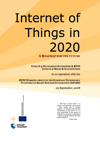The Internet of Things in 2020
A report, published in September 2008, draws the conclusions of the workshop and incorporates the views and opinions of many experts who were consulted over the six months that followed the workshop.
I was only made aware of the report last week when one of the editors – Alessandro Bassi of Hitachi Europe – presented its insights during a European Commission Info Day on Internet of Things research that I attended [and that Experientia is keen on participating in]. Now having read it, I can highly recommend this short, well-written document as quite a good introduction to the current state of affairs (even though it is meanwhile five months old).
Starting off with an overview of the technological issues themselves, the report immediately points out the barriers (absence of governance, privacy and security) before even highlighting its possible applications. The final chapters are again devoted to societal issues, with an emphasis on policy, people and environmental aspects.
Executive summary (excerpt)
There will be no limit to the actions and operations these smart “things†will be able to perform: for instance, devices will be able to direct their transport, adapt to their respective environments, self-configure, self-maintain, self-repair, and eventually even play an active role in their own disposal.
To reach such a level of ambient intelligence, however, major technological innovations and developments will need to take place. Governance, standardisation and interoperability are absolute necessities on the path towards the vision of things able to communicate with each other. In this respect, new power efficient, security centred and fully global communication protocols and sustainable standards must be developed, allowing vast amount of information to be shared amongst things and people. The ability of the smart devices to withstand any kind of harsh environment and harvest energy from their surroundings becomes crucial. Furthermore, a major research issue will be to enable device adaptation, autonomous behaviour, intelligence, robustness, and reliability. The general organisational architecture of intelligent “things†will be of fundamental importance: whether it should be centralised or totally distributed.
Another central issue of the Internet of Things will be related to trust, privacy and security, not only for what concerns the technological aspects, but also for the education of the people at large. The growing data demand and higher data transfer rates will require stronger security models employing context related security, which in return will help the citizens to build trust and confidence in these novel technologies rather than increasing fears of total surveillance scenarios. The dissemination of the benefits that these technologies can bring to the general public will also be essential for the success of this technology on the market. The real advantages of the IoT have to be shown convincingly, all citizens’ concerns must be addressed and taken into account when developing innovative solutions and proposals.





[…] Putting people first » The Internet of Things in 2020 […]